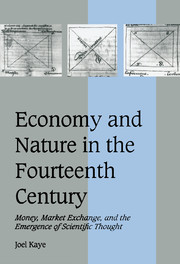 Economy and Nature in the Fourteenth Century
Economy and Nature in the Fourteenth Century Book contents
- Frontmatter
- Contents
- Acknowledgments
- INTRODUCTION
- 1 THE ECONOMIC BACKGROUND: MONETIZATION AND MONETARY CONSCIOUSNESS IN THE THIRTEENTH AND FOURTEENTH CENTURIES
- 2 THE ARISTOTELIAN MODEL OF MONEY AND ECONOMIC EXCHANGE
- 3 THE EARLIEST LATIN COMMENTARIES ON THE ARISTOTELIAN MODEL OF ECONOMIC EXCHANGE: ALBERTUS MAGNUS AND THOMAS AQUINAS
- 4 MODELS OF ECONOMIC EQUALITY AND EQUALIZATION IN THE THIRTEENTH CENTURY
- 5 EVOLVING MODELS OF MONEY AND MARKET EXCHANGE IN THE LATE THIRTEENTH AND FOURTEENTH CENTURIES
- 6 LINKING THE SCHOLASTIC MODEL OF MONEY AS MEASURE TO PROTO-SCIENTIFIC INNOVATIONS IN FOURTEENTH-CENTURY NATURAL PHILOSOPHY
- 7 LINKING SCHOLASTIC MODELS OF MONETIZED EXCHANGE TO INNOVATIONS IN FOURTEENTH-CENTURY MATHEMATICS AND NATURAL PHILOSOPHY
- Bibliography
- Index
- Cambridge Studies in Medieval Life and Thought Fourth series
3 - THE EARLIEST LATIN COMMENTARIES ON THE ARISTOTELIAN MODEL OF ECONOMIC EXCHANGE: ALBERTUS MAGNUS AND THOMAS AQUINAS
Published online by Cambridge University Press: 16 July 2009
- Frontmatter
- Contents
- Acknowledgments
- INTRODUCTION
- 1 THE ECONOMIC BACKGROUND: MONETIZATION AND MONETARY CONSCIOUSNESS IN THE THIRTEENTH AND FOURTEENTH CENTURIES
- 2 THE ARISTOTELIAN MODEL OF MONEY AND ECONOMIC EXCHANGE
- 3 THE EARLIEST LATIN COMMENTARIES ON THE ARISTOTELIAN MODEL OF ECONOMIC EXCHANGE: ALBERTUS MAGNUS AND THOMAS AQUINAS
- 4 MODELS OF ECONOMIC EQUALITY AND EQUALIZATION IN THE THIRTEENTH CENTURY
- 5 EVOLVING MODELS OF MONEY AND MARKET EXCHANGE IN THE LATE THIRTEENTH AND FOURTEENTH CENTURIES
- 6 LINKING THE SCHOLASTIC MODEL OF MONEY AS MEASURE TO PROTO-SCIENTIFIC INNOVATIONS IN FOURTEENTH-CENTURY NATURAL PHILOSOPHY
- 7 LINKING SCHOLASTIC MODELS OF MONETIZED EXCHANGE TO INNOVATIONS IN FOURTEENTH-CENTURY MATHEMATICS AND NATURAL PHILOSOPHY
- Bibliography
- Index
- Cambridge Studies in Medieval Life and Thought Fourth series
Summary
Shortly after Robert Grosseteste completed the first full translation of the Nicomachean Ethics into Latin, Albertus Magnus prepared a detailed commentary on it in the course of a series of lectures given in Cologne c. 1250. More than a decade later, Albert returned to the Ethics with a second commentary. Thomas Aquinas was one of Albert's students during the period of the Cologne lectures. In the mid–1206s Aquinas wrote his own commentary on the Ethics, based on a revised Latin translation, which showed the continuing influence of Albert's teaching. The primary intent of both Albert and Aquinas in their commentaries was straightforward clarification and explication of the text. For the most part they resisted introducing their own or orthodox positions in contrast to Aristotle's formulations, even though a detached presentation of this pre-Christian ethical system presented considerable doctrinal difficulties.
There was a great deal in the Ethics, including Aristotle's decidedly mathematical treatment of economic exchange in Book v, that was new and indeed foreign to medieval thinkers. Additional problems of interpreting Aristotle's economic thought were presented to the commentators by the imperfections of the Grosseteste translation and by the many inconsistencies found within the text itself of Book v. The early commentaries of Albert and Aquinas were remarkably successful in clarifying Aristotle's most difficult passages, and nowhere more so than in the chapters dealing with economic exchange. The influence of these first Latin commentaries on the study of the Ethics in general and on Aristotle's economic thought in particular proved long-lasting.
- Type
- Chapter
- Information
- Economy and Nature in the Fourteenth CenturyMoney, Market Exchange, and the Emergence of Scientific Thought, pp. 56 - 78Publisher: Cambridge University PressPrint publication year: 1998


